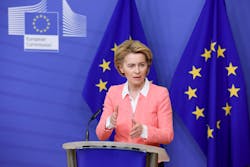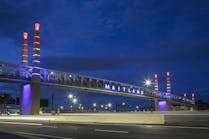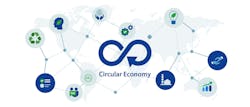UK trade body: Smart lighting must be part of Europe’s €750B recovery plan
The UK’s lighting industry trade body has issued a clarion call for smart lighting to become part of a €750 billion European Union pandemic recovery proposal that includes repairing and renovating buildings across Europe.
Although a question looms as to whether companies will continue to occupy commercial office space at anywhere near pre-crisis levels, one school of thought says that the economic slowdown has opened a serious opportunity to retrofit buildings with modern and healthy lighting that will invite occupants.
That appears to be the thinking at the Telford, England-based Lighting Industry Association (LIA), which issued a long list of modern lighting features including smart sensors and controls that together not only improve energy efficiency but also buoy human health and wellbeing and foster productivity.
“The Lighting Industry Association is supporting the call to scale up renovation across Europe and working hard to make sure it includes lighting,” the group said in a press release. “Renovation is at the heart of the European Green Deal and has been identified as a key driver for the European social and economic recovery post-COVID-19.”
The European Green Deal is in overarching initiative for Europe to become climate neutral while maintaining economic prosperity and improving health and quality of life by 2050, proposed by the European Commission last year and adopted by the European Parliament in January. EC president Ursula von der Leyen has hailed it as Europe’s “man on the moon moment.” Costs have been pegged at around €1 trillion, although nobody really knows.
The Green Deal ranges across energy, transportation, manufacturing, food, and whole host of sectors including, as the LIA noted, building renovation.
To go along with it, in late May the EC proposed a €750 billion “repair and recovery” plan called Next Generation EU to help lift Europe from the economic ravages of the coronavirus outbreak.
The plan draws on many of the precepts of the Green Deal. As the LIA noted, Next Generation EU proposes to “at least double the annual renovation rate of existing building stock.”
Those renovations must include the move to smart, energy-efficient LED lighting, the LIA said.
“There cannot and should not be any renovation of buildings in Europe without upgrading the lighting installations,” the group noted. “Lighting is essential to making a building more energy efficient but also to ensure an adequate Indoor Environmental Quality (IEQ).”
The LIA said lighting renovations should “prioritize a full renovation of luminaires to include controls and sensors” and strongly recommended that the luminaires meet a minimum level of “smart readiness,” proposing a metric it called “Smart Readiness Indicator” (SRI).
As LEDs Magazine has reported, some smart lighting companies like Holland’s Ingy are now offering luminaires that provide the option of immediately tying lights to sensors and communication chips, or that offer an easy upgrade path for users who are not yet ready to deploy such “Internet of Things (IoT) lighting” but are interested in the possibility.
Luminaires linked to embedded or external chips can collect data about room occupancy and conditions, send the data off for analysis, and use it to improve everything from lighting to general building use.
As the LIA noted, smart lighting also helps deliver the human-centric benefit of tuning illumination to support circadian rhythms. Renovations should include “mandatory minimum requirements for Indoor Environmental Quality,” the LIA said. “The Smart Readiness Indicator should be applied across the EU to maximize its energy savings potential and capture all the benefits it can bring to the wellbeing and performance of building occupants. Renovations should lead to a certain minimum SRI score.”
The LIA’s call to action in Europe comes at a time when the UK in now out of the EU — it formally left on Jan. 31 and is in a transition phase until the end of the year. Many UK lighting vendors have a strong presence in Europe.
The rallying cry echoes insights from Signify CEO Eric Rondolat, who last April noted that the health crisis presented opportunities in building retrofits and in IoT lighting. Signify is scheduled to release its second quarter results on July 24, when it might issue an update on initiatives in those areas.
As LEDs has noted before, uncertainty surrounds the general future of commercial office lighting, as the remote home working that has defined practices during the pandemic could take hold as a new norm.
Jes Staley, the CEO of Barclays Bank, noted in late April that “the notion of putting 7000 people in a building may be a thing of the past.” Twitter has told its employees that they can work from home “forever,” and Google and Facebook have for now told employees they can work from home through the end of the year.
About two months ago, Signify introduced people-distancing software to its IoT lighting to help encourage people to return safely to workplaces.
You can read the LIA’s full statement, the EU’s Green Deal, and the EC’s proposed Next Generation EU recovery plan from the LIA and EC websites.
MARK HALPER is a contributing editor for LEDs Magazine, and an energy, technology, and business journalist ([email protected]).
For up-to-the-minute LED and SSL updates, why not follow us on Twitter? You’ll find curated content and commentary, as well as information on industry events, webcasts, and surveys on our LinkedIn Company Page and our Facebook page.

Mark Halper | Contributing Editor, LEDs Magazine, and Business/Energy/Technology Journalist
Mark Halper is a freelance business, technology, and science journalist who covers everything from media moguls to subatomic particles. Halper has written from locations around the world for TIME Magazine, Fortune, Forbes, the New York Times, the Financial Times, the Guardian, CBS, Wired, and many others. A US citizen living in Britain, he cut his journalism teeth cutting and pasting copy for an English-language daily newspaper in Mexico City. Halper has a BA in history from Cornell University.





